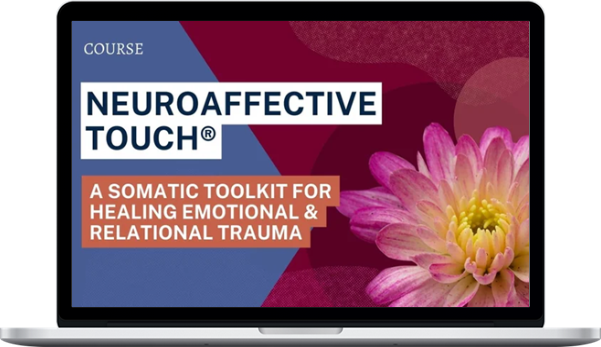Aline LaPierre – NeuroAffective Touch: A Somatic Toolkit for Healing Emotional & Relational Trauma
$47.00 $22.00
Total Sold: 1
»Instant Delivery
Description
Aline LaPierre – NeuroAffective Touch: A Somatic Toolkit for Healing Emotional & Relational Trauma
When our psychological identity is built on the shaky foundation of an early traumatized physiology, an integrated psychobiological approach to healing is necessary. This course highlights the primary role of the body and emphasizes its equal importance to the mind. It builds a vital bridge between our verbal and nonverbal selves in order to address early emotional and relational trauma.
NeuroAffective Touch®is a polyvagal-informed psychobiological approach designed for body-mind integration. The modules draw upon the key elements of developmental theory, relational psychotherapy, somatic psychology, neuroscience, and bodywork to address emotional, relational, cognitive, and developmental deficits that cannot be reached by verbal means alone.
This course aims to help you deepen your embodied presence by encouraging your personal psychobiological exploration. It is a great opportunity to discover your body in new ways. You will explore how to connect with your interoceptive awareness, apply attuned self-touch as a tool for self-regulation, and develop collaborative body-mind dialogues to enhance your internal connection with self.
Lastly, clinical work that integrates cognitive and somatic approaches—psychotherapy and body-centered work—must address legal, ethical, and scope of practice issues. This includes exploring fears around body-centered approaches, taking a touch history, and evaluating a person’s readiness to go beyond traditional talk therapy or bodywork.
What You’ll learn In NeuroAffective Touch: A Somatic Toolkit for Healing Emotional & Relational Trauma
Transform your practice by integrating psychotherapy and touch . . .
NeuroAffective Touch
- Utilize the subtle indicators of the emerging self
- Engage in collaborative mind-body dialogues to facilitate reconnection
- Apply protocols to address developmental deficits and support overall well-being
Move unconscious memories into conscious awareness with the power of mindful and intentional touch.
When our psychological identity is built on the shaky foundation of an early traumatized physiology, an integrated psychobiological approach to healing is necessary. This course highlights the primary role of the body and emphasizes its equal importance to the mind. It builds a vital bridge between our verbal and nonverbal selves in order to address early emotional and relational trauma.
A polyvagal-informed approach . . .
- . . . designed for body-mind integration.
- . . . drawing upon developmental theory, relational psychotherapy, somatic psychology, neuroscience, and bodywork.
- . . . addressing emotional, relational, cognitive, and developmental deficits that cannot be reached by verbal means alone.
This course aims to help you deepen your embodied presence by encouraging your personal psychobiological exploration. It is a great opportunity to discover your body in new ways. You will explore how to connect with your interoceptive awareness, apply attuned self-touch as a tool for self-regulation, and develop collaborative body-mind dialogues to enhance your internal connection with self.
Clinical work that integrates cognitive and somatic approaches—psychotherapy and body-centered work—must address legal, ethical, and scope of practice issues. This includes exploring fears around body-centered approaches, taking a touch history, and evaluating a person’s readiness to go beyond traditional talk therapy or bodywork.
Participants in this NeuroAffective Touch course will learn to
- Recognize the subtle yet powerful indicators of the emerging self as they are revealed in sensation, imagery, posture, and gesture.
- Engage in collaborative mind-body dialogues that support reconnection with the disrupted developmental matrix.
- Apply NeuroAffective Touch® protocols to address developmental deficits: learn to create a Nurture Surround™, support the cranial base, brainstem, and spine.
- Interrupt the brain’s predictive mechanism to maintain a somatic time-line awareness.
- Experience the internal sensory systems of interoception and neuroception and the touchpoints for the heart, lungs, enteric nervous system, and throat that are their bodily base.
- Explore the Social Engagement System through the neuropsychological convergence of the ears, eyes, jaw, cranial base, and throat.
- Work with early development without creating dependency.
Apply attuned self-touch as a tool for self-regulation.
Course Includes
- 4 On-Demand Lectures
- 8 Hours of Content
- Three Bonus Lectures
- Downloadable Slides
- Course Resources
About Aline LaPierre
Dr. Aline LaPierre is a pioneer in the field of somatic psychology. She is the creator of NeuroAffective Touch® an approach integrating the therapeutic use of touch, nonverbal communication, and somatic psychotherapy. She is the founding director of the NeuroAffective Touch Institute, offering mental health and body-centered practitioners training in the vital use of touch when working with developmental, relational, and emotional trauma.
Dr. LaPierre is the co-author of Healing Developmental Trauma: How Trauma Affects Self-Regulation, Self-Image, and the Capacity for Relationship, now available in twelve languages. She was faculty in the Somatic Doctoral Program at Santa Barbara Graduate Institute for ten years and is currently Deputy Editor of The International Body Psychotherapy Journal, a peer-reviewed journal bringing together a global somatic community of psychologists, psychotherapist, body-centered practitioners, researchers, and students.
A graduate of Pacifica Graduate Institute in Santa Barbara, and of The New Center for Psychoanalysis in Los Angeles, Aline has trained in many body-centered modalities including BodyMind Centering, Continuum, EMDR, Neuromuscular Therapy, and Visceral Manipulation.
More courses from the same author: Aline LaPierre
Delivery Policy
When will I receive my course?
You will receive a link to download your course immediately or within 1 to 21 days. It depends on the product you buy, so please read the short description of the product carefully before making a purchase.
How is my course delivered?
We share courses through Google Drive, so once your order is complete, you'll receive an invitation to view the course in your email.
To avoid any delay in delivery, please provide a Google mail and enter your email address correctly in the Checkout Page.
In case you submit a wrong email address, please contact us to resend the course to the correct email.
How do I check status of my order?
Please log in to HealthcareCourse account then go to Order Page. You will find all your orders includes number, date, status and total price.
If the status is Processing: Your course is being uploaded. Please be patient and wait for us to complete your order. If your order has multiple courses and one of them has not been updated with the download link, the status of the order is also Processing.
If the status is Completed: Your course is ready for immediate download. Click "VIEW" to view details and download the course.
Where can I find my course?
Once your order is complete, a link to download the course will automatically be sent to your email.
You can also get the download link by logging into your HealthcareCourse account then going to Downloads Page.
Related products
Total sold: 2
Total sold: 4
Total sold: 4









